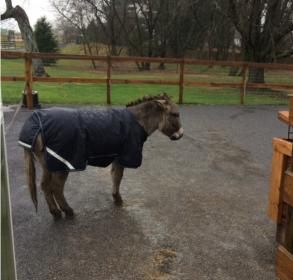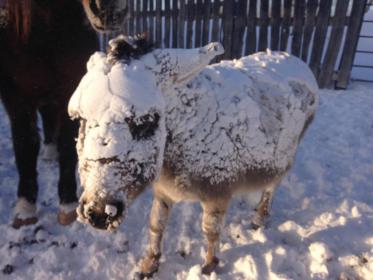Published in Equine Veterinary Journal.
That is really interesting! I’m not around donkeys on a daily basis so I’ve never noticed their coats. I wonder if they ever adapt. The article sounds like they don’t.
in my experience donkeys while fluffy the coat isn’t as dense as a horses and they are not as waterproof - lots of people here barn their cattle donkeys for the winter or the ones that are horse companions are blanketed.
This is true for my 10-hand mule, Mycroft. Luckily, he has a better turnout rug than my large pony’s, because it was drastically marked down!
Most of our farm mules in the mountains never did hair up like the horses did in the winters.
They were slick all year around.
We thought that was because they were out of riding, lighter and less hairier mares than our cold blooded draft horses.
Maybe it was the donkey in them?
This makes sense. They’re desert animals aren’t they?
Studies on Irish donkeys have been done relating to this. Results show the donkey needing more shelter and protection than horses and ponies. Donkey foals will get pneumonia if chilled very long, easy to lose them. Donkey hair doesn’t dry fast, stays wet to cause problems on those Irish donkeys.
My donkeys are certainly fluffy and warm, it is thick, long, slightly curled, so retains warmth. Also, seems to shed water well, but they never go out in it :lol:. But the minis (Mediterranean?) are a different breed, so who knows? I do know I have to clip them in the summers.
Huh. Our donkeys are slick coated about two weeks in the summer and then immediately start growing their coat again. They’re pretty wooly, but then again, we’re in the high desert, where it gets cold but not terribly wet. I can see where the damp would sit uncomfortably in their coats with a different climate.
Our mini donkey agrees with these findings :lol: She HATES the cold or wet weather- we leave the barn open for her anytime it rains, and she basically boycotts going outside if there is snow on the ground. We also blanket her if it’s wet or gets cold, despite her long thick coat. On the other hand, she will lounge out sunbathing in her paddock when it’s 90 degrees out in July 
I find that to be true. Donkeys have a much harder time keeping warm, and usually need blankets mostly to stay dry. I don’t believe they can “shed” water/snow like a horse can which causes them to become wet and cold.
I have never had a horse regulate it’s coat to the climate they lived in. They either had a thick coat every year, or they didn’t. Made no difference if we lived in CA, MN or in-between or if the Winter was brutal or mild…
Interesting about donkeys though.
This was true for our mule too. She had the oddest hair coat, coarse, wirey, curly when long. We thought it was more like buffalo hair than anything horsey. She really liked being brushed hard. She shed at the hottest time of the year, August, had shiny, sleek coat for the couple weeks and then new coarse hair started coming in. She did not seem to ever be cold or get wet in snow or rain with this coat but she loved HOT weather. Rolled and rolled in the dirt, jumped up to race around while the rest of us were sweating standing still.
Makes sense to me. My mini gets a very thick coat but it does not seem to shed water as well as the horses’. He has an Amigo foal blanket with tailored belly straps. I usually only blanket him when it’s cold and wet, but maybe he would appreciate it on cold, windy days too. Yesterday was one of those and he cowered in the shelter more than the horses did.
Now someone needs to explain to me why he likes to stand outside in the rain looking miserable when he has a warm, dry stall full of hay! Good opportunity for an Eeyore impression I guess?
[ATTACH=JSON]{“data-align”:“none”,“data-size”:“large”,“data-attachmentid”:9933917}[/ATTACH]

The news about donkeys needing more protection from the elements than horses is not new. Before I acquired my donkeys, I took a course at The Donkey Sanctuary’s Derbyshire Centre over 21 years ago. Their work on all things “donkey” has put them at the forefront of donkey research and knowledge. Equine vets from all over the world use The Donkey Sanctuary’s vast repository of information about the species to help treat their clients’ long-eared friends. The Sanctuary’s work in Third World countries provides invaluable assistance in addressing the animals’ medical and welfare needs, while helping the donkeys’ owners benefit from healthier, sound working stock.
Donkeys are not smaller, long-eared horses. Everything about their being sets them apart from horses: medical parameters, i.e. their temperature and blood work, to name a few; their nutritional needs; their coat and hooves. Donkey husbandry is NOT applicable to horses and vice versa.
On the topic of their coats, donkeys do not have waterproof coats. They don’t have the oils in their coats to prevent them from being soaked to the skin in rain storms or heavy snow melt. The rate of hair growth is predicated on genetics and the amount of sunlight, or lack thereof, they receive, not on the temperature of the season. One of the first things I learned about donkeys all those years ago, was that they had to have a dry, clean barn, particularly in wet, cold climates.
My first experience with Poitou donkeys was when I met a small herd of 12 donkeys in a paddock next to the zoological park that owned them. I spent almost an hour stroking them, even putting my arms around several of them. The weather was warm (early September) and they were extremely heavily coated. I came away from the experience thinking my car would stink from all that contact. Not at all. There wasn’t even a hint of aroma, and my fingers and hands were unmarked. That is, there was no oil on my skin. My two Poitou girls never have body odor. The same was true of my long-gone standard donkeys…you could bury your face in their necks and never come away “fragrant.”
[ATTACH=JSON]{“data-align”:“none”,“data-size”:“medium”,“data-attachmentid”:9937912}[/ATTACH]
Poncho says protection my ASS…
We had a freak overnight, not forecast spring storm. My old mare had the horses stood in their usual place under the hedge…seemed it provided great protection at horse level, not so much for short Donkey…and yes he was fine, got him brushed off, it was just laying on top, nothing had gone down into his coat.

If you blanket a working horse heavily enough that they don’t need all that hair, they will get rid of it. I was a little late starting to blanket this year because our temperatures were all over the map. My horse is now shedding like it’s spring. I knew another horse who would go nearly bald when blanketed with a stable blanket. I’m good with it. I’d rather blanket more heavily than deal with a horse that gets sweaty in the winter.
Further observation to that, when I got my horse the fur was unbelievable and she was on the thin side. The following winter she started to grow a bunch of hair and I clipped and blanketed. There has been no excessive hair growth since then. My guess is that she has regulated her hair growth due to a combination of sufficient body fat and altering her climate through blanketing, indoor draft free housing, and limited turnout in inclement weather.
Until I read this thread, I had been on the fence about blanketing the mini-donkey we acquired at the end of the summer. I wasn’t sure how she was going to react but was afraid it was going to be a fight. She stood still through the whole thing including twisting the leg straps between her legs. I was shocked. She is happy as a clam in her new blanket. Nice soft eyes as soon as I was done. I suspect she had been blanketed in the past. She is so cute in her burgundy threads.
KBC that picture is fantastic
Because of this discussion, I paid very close attention to my mule during this week’s miserable rainy cold front. The mule, with his nice fuzzy winter coat, got very wet, and took forever to dry once the sun came out. The horse was dry in a fraction of the time, although the horse also has less of a winter coat and more sense about standing inside in the rain. But, the mule didn’t seem to be bothered by the cold or by being wet.
And don’t anyone think that I’m neglecting the poor cold, wet beasts. I did break out the blankets for last night’s forecast low of 28. That’s really, really cold by Florida standards.
